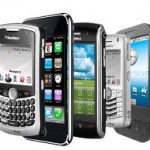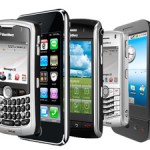MOBILE PHONE WAR HEATS UP
 OK, Apple has now introduced yet another “smartphone,” the iPhone 4S. More importantly, they have now increased their distribution channel by offering it to Sprint customers. Prior to this “launch,” iPhones were only offered through Verizon Wireless and AT&T.
OK, Apple has now introduced yet another “smartphone,” the iPhone 4S. More importantly, they have now increased their distribution channel by offering it to Sprint customers. Prior to this “launch,” iPhones were only offered through Verizon Wireless and AT&T.
The market share war, which includes Apple (iPhones), Google (Androids), and RIM (Blackberrys) is now in high gear which will invariably affect profitability in the long run. Apple has already reduced the price of some its older iPhone models.
As for those of you that are thinking about upgrading to a “smartphone,” remember the ground rules:
1. It’s the provider first (Verizon, AT&T, Sprint, etc.). Make sure that you are getting acceptable service in both your home and office. Service varies by mobile phone provider, and if your service is poor, consider switching. Having the latest and greatest phone will not help if your calls are being dropped or the Internet connection is slow. Ask your neighbors both at home and office what providers work for them.
2. Smartphones come in all sizes and weight. While they all offer telephone services and data plans for e-mails, Internet and apps, you must be comfortable with your mobile device. Once you own a smartphone, you will find that you will be depending more and more on it for e-mail and Internet access.
3. Make sure you understand the terms of the data plans which are separate charges over and above your telephone plans. A full explanation can be found on an earlier blog, All About Data Plans.
4. When you have decided on the right wireless provider, walk into one of their stores and play with all the available smartphones for comfort level. iPhones only have touch screens, some Android models offer both touch screens as well as a slide out keyboard. The Blackberry has lost market share, however they are still popular and should not be ruled out.
If you have any questions about the mobile phone market or any other technology questions, do not hesitate to contact me at 917 921-4518 or by e-mail at jblue@bluetutor.com. If you are in career transition, feel free to click here to receive my free white paper on Technology Tips on setting up a home office and becoming a true road warrior.
BACK TO SCHOOL TECHNOLOGY TIPS
 Is your child or grandchild off to college for the first time? If they are returning to school and into an off campus apartment, it is important to address their technology needs. No longer is it just textbooks, clothing and bank accounts on your to-do list. With technology imbedded in both their personal and educational lives, there are a number is issues that must be addressed, hopefully before move-in time. The following are some of the more important things that should be included on your to-do list.
Is your child or grandchild off to college for the first time? If they are returning to school and into an off campus apartment, it is important to address their technology needs. No longer is it just textbooks, clothing and bank accounts on your to-do list. With technology imbedded in both their personal and educational lives, there are a number is issues that must be addressed, hopefully before move-in time. The following are some of the more important things that should be included on your to-do list.
– Most colleges have removed phones from dorm rooms. Your student probably already has a cell phone. However, you must make sure the provider you are using (Verizon, AT&T, Sprint, etc.) has a strong signal at school. Call the school and, if possible, talk to some other students about their experience.
– Check your cell telephone plan. If your student is not going to be in your local area, make sure you have a nationwide plan. In addition, check your usage. More than likely, your usage will increase since you will be speaking with your child more than you think.
– Check your text messaging plan. Most students rely heavily on text messaging which is a simple way of communicating.
– Find out what type of Internet plan the school provides. Does the dorm offer wi-fi connectivity? How about the rest of the campus?
– Most students bring a laptop to school with them. MACs are more popular than Windows based computers. If you need to buy one, most schools have discount plans with different manufacturers. Apple has a student discount plan. Schools offer substantial discounts on most software.
– Are you a Skype user? Being able to video chat makes both students and family members still feel connected. If you and your student both have MACs, you can use iChat. Skype and iChat are similar. However iChat only works if you both have a MAC. Both services are free from any part of the world, as long as you are both on a computer.
– For those students living in off campus apartments, make sure they contact the local cable company to install a modem/router along with their TV service. No need to spend money on installing a land line. A cell phone is sufficient.
Finally, don’t forget the cables. Although the school might have wi-fi, bring along an ethernet cable as well as extension cords. I suggest that everyone have at least two cell phone chargers; one for the room and another to carry with them, since the newer smartphones have limited battery life.
As a parent that has gone through this process of number of times, do not hesitate to contact me if you have any questions regarding either your students’ or your back-to-school needs. I can be reached either by e-mail at jblue@bluetutor.com or by phone at 917 921-4518.
DO YOU CARRY YOUR CELL PHONE WITH YOU?
10 Reasons to keep it close by
 Although cell phone use in the US is well over 90%, there are still individuals that have resisted the urge to “become wired.” Although many of us would like the ability to escape and not be reached, there are many reasons why having a cell phone has become a necessity. The following are some of the more important ones:
Although cell phone use in the US is well over 90%, there are still individuals that have resisted the urge to “become wired.” Although many of us would like the ability to escape and not be reached, there are many reasons why having a cell phone has become a necessity. The following are some of the more important ones:
1. You are almost always accessible. It is possible to limit your accessibility by switching the phone to a vibrate only mode, or turning it off, when at the movies or at dinner for example.
2. In case of emergency, you can reach out for help whether you are lost, have a flat tire or in need of medical assistance.
3. Running late? You can either call or send a text message.
4. Keeping in contact with your children whether it be a change of plans or out late at night.
5. If you are a senior, the ability to keep in touch with your family. If you are living alone, giving your children peace of mind.
6. Cost – Long distance calling is usually cheaper.
7. Taking a trip? – Have your home calls transferred to your cell phone.
8. If you are dependent on e-mail, you can purchase a “smartphone” that permits you to access your messages from anywhere.
9. An easy way of having access to all your contact information.
10. An extra alarm clock.
If you need assistance determining what type of cell phone is best for you or want to discuss upgrade options, do not hesitate to contact me at 917 921-4518 or by e-mail at jblue@bluetutor.com.
CONFUSED BY YOUR CELL PHONE BILL?
What is a Tiered Data Plan?
 Recently released statistics (as reported by CNN.com) indicate that more than a third of U.S. adults now own smartphones. The Nielsen Company reports that smartphones represent over 50% of all new cell phone purchases.
Recently released statistics (as reported by CNN.com) indicate that more than a third of U.S. adults now own smartphones. The Nielsen Company reports that smartphones represent over 50% of all new cell phone purchases.
By definition, a smartphone is any mobile device that combines functions such as telephone, e-mail, Internet access, contact information, and calendar. The three major suppliers of smartphones are Apple’s I-Phone, RIM’s Blackberry, and Google’s Android.
Cell phone providers (Verizon, AT&T, Sprint, etc.) offer a variety of telephone plans based on your usage. While the telephone plans are the same for smartphones, there is an additional charge for “data,” meaning e-mail and Internet access. These charges add an additional $30 and up to your bill.
Several weeks ago, following the lead of its competitors, Verizon ended its “unlimited” data plan and introduced “tiered” pricing. The end of the unlimited era has confused many consumers who do not understand the new pricing structure which is based on the amount of data usage. Verizon now offers monthly plans of $30 for 2GB of data, $50 for 5GB of data and $80 for 10GB of data. Additional fees will apply if you exceed the limits of your plan.
In order to determine what plan is best for you, below is a list of functions that will impact your data usage.
1. Streaming video – Watching video on programs such as YouTube or full length movies on services like Netflix and Hulu on your smartphone or I-Pad.
2. Streaming Audio – While it is OK to play music from your I-Tunes library, using Internet Radio programs such as Pandora eats into your usage (although not as much as video).
3. Navigation systems – Using your smartphone on the road as opposed to an in-car navigation system.
4. Internet Use – Sites with significant amounts of data.
Accessing social media sites such as Facebook will not consume a lot of megabytes. However uploading photos will. Twitter is fine since it deals mainly with small amounts of text. No need to worry about e-mail, since it is basically plain text. However, if you receive attachments with high resolution pictures, your usage will increase.
An alternative to using your cell phone provider’s data service is using Wi-fi wherever it is available, whether that be at home, in your office or a “hotspot.” There are no data limitations with a wi-fi connection.
As for me, I am on the road quite a bit and use my smartphone all day. An analysis of my usage indicates that I am well under 2GB per month, which should be more than sufficient for the average mobile warrior. I suggest you check with your service provider who is able to provide you with an analysis of your usage prior to selecting a pricing package.
If you have any questions about your cell phone situation, want to discuss a possible upgrade, or any other technology issues, give me a call at 917 921-4518 or send an email to jblue@bluetutor.com.
Click HERE to join my mailing list and receive my FREE whitepaper on setting up a home office and becoming a true road warrior.
WHY YOU SHOULD TAKE A MAGICJACK ON THE ROAD WITH YOU
 Traveling overseas? Concerned about keeping in touch? Using your cell phone will be expensive. If you bring your laptop and have Internet access, you should have a MagicJack as a companion.
Traveling overseas? Concerned about keeping in touch? Using your cell phone will be expensive. If you bring your laptop and have Internet access, you should have a MagicJack as a companion.
Pictured on the left, a MagicJack is a tiny device that is plugged into one of the USB slots in your computer. The device costs $39.99 with an annual fee of $19.99. Not only that, but when you purchase a MagicJack, you get the first year for free. No monthly charges. You can purchase one at places like Best Buy or online at magicjack.com.
How does it work? When you sign up, you select a phone number with your local area code (in New York, either 917,646, or 347). What this means is when you plug your MagicJack into your computer, you are calling through the Internet and you can call anywhere in the US for free.
This works also in the US. So if you don’t want to use your cell phone from a hotel room or borrow someone’s phone, stick the MagicJack into your computer and make your call. If you want privacy, you can use a headset.
Free caller ID, free voice mail, free directory assistance……. Free …. Free …. Free!!
If you have any questions regarding MagicJack or any other technology issues, give me a call at 917 921-4518 or e-mail me at jblue@bluetutor.com.
WHAT IS CLOUD COMPUTING??
 Whether or not you realize it, you have been using a cloud based service since you first started using a computer. These services include AOL, Hotmail, and G-Mail accounts. Chances are they you are one of the half billion plus members of Facebook.
Whether or not you realize it, you have been using a cloud based service since you first started using a computer. These services include AOL, Hotmail, and G-Mail accounts. Chances are they you are one of the half billion plus members of Facebook.
Well, welcome to “the cloud!” Simply defined, cloud computing means having every piece of data you need at your fingertips and ready for use, being able to access all of your personal data at any given moment, having the ability to organize and store data from any computer, and on any model device. Using the cloud permits you to share that data (proposals, photos, movies, contacts, e-mail, documents, etc.) with your friends, family, clients and coworkers.
There are many excellent free cloud based programs that are extremely useful for your business. My favorite is Dropbox. I store all data in Dropbox that I would like to access from another computer or my mobile devices while on the road. You can store up to 2 GIGs for free. For $9.99/mo., you can store 50GIGs. I find the free version is plenty for carrying around what I need. As I write this blog, it is stored at Dropbox in order for me to able to work on it from wherever I am located. Another favorite of mine is Evernote. Instead of carrying around little scraps of paper with reminders scribbled on them, I enter them from any computer or mobile device into Evernote. Both sites are password protected. There are a host of other cloud based services and programs available ranging from news services, financial market reports, video conferencing, movie listings, flight information, hotel reservations, weather, etc.
No need to be afraid. Accessing the cloud is safe and secured as long as you know the site. You do it on your personal computer every time you use the computer.
With the world becoming more mobile and the fact that, in just a few years, more people will be accessing the Internet through one of the handheld devices (Blackberries, I-Phones, I-Pads, and Androids), cloud computing will continue to gain in popularity.
So, get with it! Join the cloud group. If you have any questions regarding cloud computing or any other technology issue, give me a call at 917 921-4518 or e-mail me at jblue@bluetutor.com.
WANT TO ACCESS THE INTERNET ON THE ROAD?
 While many of us now own a “smartphone,” I-Pad or other small tablet size device with Internet access, a full size laptop is often necessary to work on documents and other projects that are not easily managed on handheld devices. It is now possible to buy a laptop with wireless access using the cellular networks. However using your provider’s (Verizon, AT&T, etc.) cellular network to access the Internet can be slow and spotty.
While many of us now own a “smartphone,” I-Pad or other small tablet size device with Internet access, a full size laptop is often necessary to work on documents and other projects that are not easily managed on handheld devices. It is now possible to buy a laptop with wireless access using the cellular networks. However using your provider’s (Verizon, AT&T, etc.) cellular network to access the Internet can be slow and spotty.
My solution is a credit card size device from Verizon called Mi-fi. This mobile device permits me faster access to the Internet using wireless technology (which is faster than the cellular network) for as many as 5 wireless products at a time.
With my Mi-fi card, I no longer need to look for a hot spot for Internet access. I can work in the park, in my car or commuter bus or train. Not only am I free to work anywhere there is service, the connection is secure since the device requires a password, which means that no one is able to join my network, much like being at home with a secured router. I am able to access sites requiring passwords and bank accounts without worrying about my neighbor sitting in a coffee shop next to me accessing the same unsecured network.
Yesterday, the Internet in my home was down. No problem. I simply turned on my Mi-fi device and the three of us were all able to use the Internet simultaneously until the situation was resolved.
The Mi-fi is not for everyone and it costs a minimum of $50/month based on your usage. In addition, while you are able to get a global model, the costs of using it abroad will be exorbitant, similar to using your phone overseas. Better to use a wireless hotspot (although not secured). However for those of you that require secure Internet access on the road, it is an excellent accessory.
If you have any questions about the M-fi, or other technology issues, give me a call at 917 921-4518 or e-mail me at jblue@bluetutor.com.
